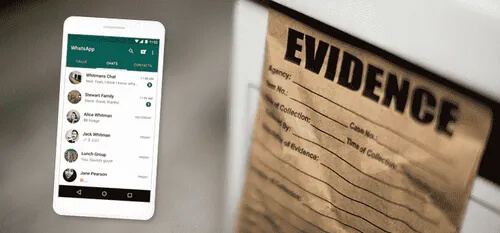
Indian courts are increasingly grappling with the admissibility of this "digital evidence," particularly WhatsApp chats, which have become ubiquitous. From casual conversations on WhatsApp to official emails and online transactions, a significant portion of our interactions leaves a digital footprint. Naturally, as society evolves, so too must our legal frameworks. This blog explores the current legal landscape, the challenges involved, and the path forward for effectively utilizing digital evidence in India.
The Dawn of Digital Evidence in India
The Information Technology Act, 2000 (IT Act), drawing inspiration from the UNCITRAL Model Law on Electronic Commerce, aimed to provide legal validity to electronic transactions and communications.
Key provisions that came into play are Sections 65A and 65B of the Indian Evidence Act.
* Section 65A broadly states that the contents of electronic records may be proved in accordance with the provisions of Section 65B.
* Section 65B lays down specific conditions that must be fulfilled for an electronic record to be considered a "document" and be admissible as evidence without further proof or production of the original.
WhatsApp Chats: A Double-Edged Sword
WhatsApp chats can be crucial pieces of evidence in a wide range of cases, from divorce proceedings to criminal investigations and commercial disputes. However, their very nature – ease of creation, manipulation, and deletion – makes their admissibility a complex issue.
Conditions for Admissibility of WhatsApp Chats (and other Digital Evidence)
For WhatsApp chats and other digital evidence to be admitted in Indian courts, the following key conditions, primarily derived from Section 65B(2) of the Indian Evidence Act, must generally be met:
*Computer Output: The information must be contained in an electronic record that was produced by a computer (which includes devices like mobile phones).
* Regular Use: The information was fed into the computer in the ordinary course of the said activities.
* Proper Functioning: The computer was operating fittingly. If not, any malfunction should not affect the accuracy of the electronic record.
* Reproducibility: The information reproduced from the electronic record must be a reproduction of what was fed into the computer in the ordinary course of the said activities.
The Indispensable Section 65B Certificate
The most crucial and often debated aspects of digital evidence admissibility is the requirement of a certificate under Section 65B(4). This certificate is vital when the electronic record is sought to be admitted as "secondary evidence" (e.g. a printout of WhatsApp chat). The certificate must:
* Identify the statement in electronic record.
* The electronic record was produced in which manner.
* Give particulars of the device involved in the production of that electronic record.
* Be signed by a person occupying a responsible official position in relation to the operation of the relevant device. This person must state that the conditions laid down in Section 65B(2) are satisfied.
Case Study:
The Supreme Court's pronouncements, particularly in Anvar P.V. vs. P.K. Basheer (2014) and later clarified in Arjun Panditrao Khotkar vs. Kailash Kushanrao Gorantyal (2020), firmly established the mandatory nature of this certificate for secondary electronic evidence. While there was some divergence in earlier judgments (like Shafhi Mohammad v. State of Himachal Pradesh), the current position is clear: a Section 65B certificate is generally essential unless the original electronic record is produced as "primary evidence" (e.g., the original phone with the live chat displayed, and the owner testifying to its authenticity).
Practical Considerations for WhatsApp Chats:
* Authenticity and Integrity: WhatsApp chats are genuine involves establishing the sender's identity, the time and date of messages, and ensuring the content presented to the court is an accurate reflection of the original. Blue ticks indicating delivery and reading can support successful transmission and receipt.
* Chain of Custody: Documenting how the WhatsApp chats were accessed, extracted, preserved, and presented to the court is vital to demonstrate their integrity.
* Relevance: The chats must be relevant to the facts in issue in the case.
* Forensic Analysis: In complex cases, forensic experts may be required to analyze the device and data to establish authenticity, recover deleted chats, or demonstrate tampering.
Challenges and the Way Forward
Despite the legal framework, several challenges persist in the realm of digital evidence:
* Technical Expertise: A lack of technical understanding among legal professionals and even some judicial officers can hinder the effective evaluation and appreciation of digital evidence.
* Tampering and Manipulation: Electronic records are inherently susceptible to alteration. Ensuring their integrity remains a significant hurdle.
* Jurisdictional Issues: Data stored on cloud servers located outside India can complicate retrieval and raise jurisdictional conflicts.
* Privacy Concerns: The admissibility of personal chats, especially when obtained without consent (as seen in some recent cases like the Madhya Pradesh High Court ruling allowing a wife's WhatsApp chats in a divorce case), can clash with privacy rights.
* Digital Forensics Infrastructure: The availability of adequate digital forensic labs and trained personnel is still a challenge, leading to delays in investigations and trials.
Conclusion
WhatsApp chats and other forms of digital evidence are undeniably powerful tools for uncovering the truth in legal proceedings. While Indian law has made significant strides in recognizing and regulating their admissibility through the IT Act and the Indian Evidence Act, the journey is ongoing.
For digital evidence, particularly WhatsApp chats, to be effectively utilized, a multi-pronged approach is needed. This includes continued judicial clarity on procedural aspects, enhanced technical training for legal professionals, robust digital forensic capabilities, and a careful balancing of evidentiary value with fundamental rights. As technology continues to evolve, the legal system must remain agile, adapting its principles to ensure that justice is served in the digital age. The goal is not merely to admit digital evidence but to ensure its reliability and authenticity, thereby strengthening the pursuit of truth and fairness in our courts.
By Anurag Pratap Singh
3rd year BBA.LLB
Noida International University
N-55, Sri Niwas Puri, New Delhi 110065
ireneslegal9@gmail.com
+91 995 378 5058
Copyright © ireneslegal.com. All Rights Reserved.
Designed by Questend India Pvt Ltd